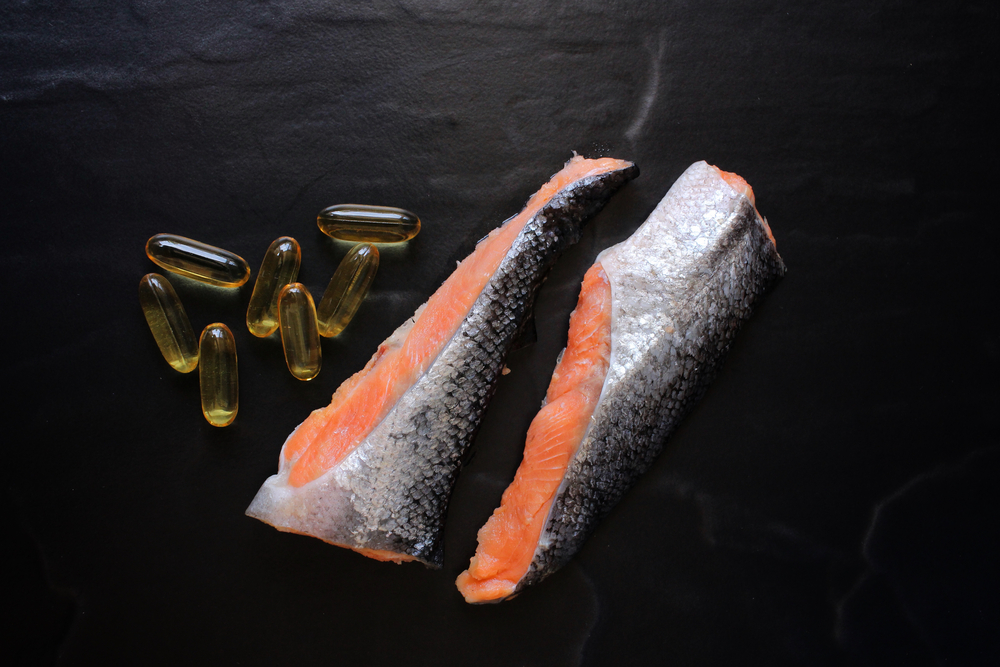If you’re like many dog owners, you’ve witnessed firsthand the benefit of giving your dog an omega-3 fish oil supplement. Many owners report seeing a substantial improvement in the skin & coat health of their dog. A growing body of studies have also shown other, less visible benefits ranging from heart health to brain health to immune support. In a recent survey conducted by iHeartDogs to 1,433 readers, a full 39% of dog owners reported giving their dog an omega-3 fish oil supplement.
In the last few years, however, many dog owners have reported switching sources of omega-3 fatty acids. Concerns have centered around the following two areas:
1. Concerns Over Toxicity from Larger Fish Sources Such as Salmon or Cod Liver

It comes as no surprise to most that our oceans are growing more polluted by the year. This contamination affects larger species of fish significantly more than smaller varieties due to their place on the food chain. Larger fish eat smaller fish, leading to an accumulation of heavy metals and other toxins in the fat reserves of larger species. A 2011 study 1 on New Jersey coastal fish showed that a full one third of the sampled fish had levels of mercury higher than 0.5 parts per million, a dangerous level that could pose health concerns for those who regularly eat fish.
These concerns have led many dog owners to switch to a source of omega-3 DHA and EPA from a smaller fish source such as krill, phytoplankton, or marine algae. Although there is still some debate over just how much toxicity is present in fish products (such as salmon oil), many dog owners have switched sources as a precautionary measure. However, there is far less debate over concern number two.
2. Lower Absorption Rate Compared to Phospholipid Forms of Omega-3 Such as Krill Oil

In recent years, scientists have begun to understand just how much the source of omega-3 matters to how its absorbed and effectively used by the body.
Fish oil in the form of omega-3s are attached to triglycerides, which must be broken down by the digestive system of your dog in order for the DHA and EPA parts to be used. It’s estimated that up to 80% of triglyceride attached omega-3s are eliminated 2 by the digestive system, rendering them useless for your dog’s body.
In contrast, omega-3s found in krill oil are attached to both triglycerides and phospholipids. The phospholipid form of omega-3s have been found to offer significantly greater bioavailability and are absorbed by the body as much as 10 times as well as fish oil. 2 In addition, two studies have shown that krill oil has had positive effects on markers of inflammation and arthritis. 3 4
RELATED: 7 Reasons to Give Your Dog Krill Oil
An additional benefit to krill oil is that it also contains a marine-source flavonoid called astaxanthin which creates a special bond with DHA and EPA. This in turn allows direct metabolism of the antioxidants, making them more bioavailable (absorbable) to the dog.
Summary
In summary, we encourage you to do your own research and talk to your veterinarian when evaluating your dog’s fish oil. For us, concerns over toxicity and the inferior absorption of triglyceride based fish oils have led us to switch sources. If you’d like to learn more about the krill oil we use and recommend, please visit this article.
Sources & Citations
- Burger, Joanna; Gochfeld, Michael (2011). “Mercury and Selenium Levels in 19 Species of Saltwater Fish from New Jersey as a Function of Species, Size, and Season”
- Dr Joseph Mercola “Your Practical Guide to Omega-3 Benefits and Supplementation”
- Deutsch L. Evaluation of the effect of neptune krill oil on chronic inflammation and arthritic symptoms.
- Ierna M., Kerr A., Scales H., Berge K., Griinari M. Supplementation of diet with krill oil protects against experimental rheumatoid arthritis.
*These statements have not been evaluated by the Food and Drug Administration. No product is intended to diagnose, treat, cure, or prevent any disease. The information on this website is not intended to replace a one-on-one relationship with a qualified health care professional or veterinarian.
 Toledo, United States.
Toledo, United States.